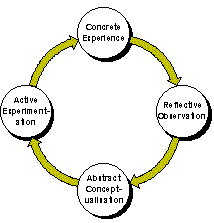Theme of the chapter.
The theme of the chapter is experiential learning (Merriam, Caffarella, & Baumgartner, 2006). This involves the integration of practice and theory and the relevance of academic learning among the adult. This touches on the unrecognized feelings and learning experiences, social isolation, self-defeating thoughts, self-doubts and unfulfilled hopes as regards learning and adult education.
Models of experiential learning.
Experimental learning refers to the process of making and deriving meaning from experiences. It involves learning from experience. The model of experimental learning developed by David Kolb, also called the experimental learning cycle, is as follows (Walklin, 2006);
- Concrete Experience.
- Observation and reflection.
- Forming abstract concepts.
- Experimentation.

- Concrete Experience – in this phase, learning starts when an individual carries out a certain action and then sits back to see the effect of the action on the particular situation.
- Observation and reflection – the learner moves to the next step where he understands the effect of his actions. The intention of this second step is to help the learner predict the effect of his action if the same action took place under similar circumstances. This step leads us to the third step.
- Forming abstract concepts – the learner understands the principle under which the particular situation falls. The learner understands the model of the observation.
- Experimentation – the learner plans how to test a plan or model of an upcoming experience (Walklin, 2006).
How educators’ roles and purposes affect experiential learning.
The role and purposes of educators in experimental learning include the following; consultant, helper, instructor, facilitator, teacher, mentor and change agent. They affect experimental learning through working and promoting socially responsible and relevant ways that promote societal change by the promotion of participatory learning process of adult citizens. The teachers present a safe and friendly learning environment.
They facilitate the adult education by engaging them in experiences that are fundamentally reflective due to their relevance to learner’s lives (Merriam, Caffarella, & Baumgartner, 2006). Educators have authority over learners; therefore, they reinforce overriding paradigms where lessons are taught from educators instead of the learners discovering through the process of critical reflection and meaningful experience.
They also provide students with feedback and this helps them understand where they went wrong, what they need to improve, and what they have learned. The educators help them by asking questions that encourage learners to answer and take ownership of their answer (Walklin, 2006).
The correlation between experiential learning and andragogy and/or heutagogy
Androgogy influences the ways in which learners are treated in a program while experimental learning influences the development of learning activities and training plans. Comparison between adult learning-based models and theories versus the traditional methods (Walklin, 2006).
References
Merriam, S. B., Caffarella, R. S., & Baumgartner, L. M. (2006). Learning in adulthood: A comprehensive guide (3rd ed.). San Francisco: Jossey-Bass.
Walklin, L. (2006). Teaching and Learning in Further and Adult Education. Boston: Nelson Thornes.